Bayerische Motoren Werke Bundle
Can BMW's Bold Moves Drive Future Dominance?
From its game-changing X5 launch to its ambitious 'Neue Klasse' platform, Bayerische Motoren Werke (BMW) has consistently redefined automotive excellence. Founded in 1916, BMW's journey from aircraft engines to global automotive leader showcases its remarkable adaptability. Today, with a significant market share in the luxury segment, BMW's future hinges on its strategic vision and ability to navigate the evolving automotive industry.
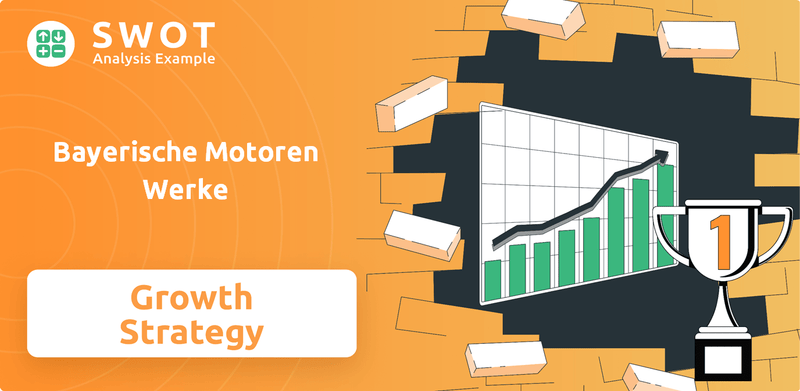
This exploration delves into the Bayerische Motoren Werke SWOT Analysis, examining BMW's growth strategy and future prospects. We'll analyze BMW market analysis, including its expansion plans in China, electric vehicle strategy, and the impact of autonomous driving on BMW's long-term business goals. Furthermore, we'll investigate BMW's competitive landscape analysis and sustainable growth initiatives to provide a comprehensive understanding of its trajectory in the automotive industry, including BMW sales forecast for next 5 years.
How Is Bayerische Motoren Werke Expanding Its Reach?
The Owners & Shareholders of Bayerische Motoren Werke are actively driving significant expansion initiatives, with a strong focus on electrification and digital transformation. This strategic shift is pivotal for the company's future, aiming to solidify its position in the evolving automotive industry. Key to this strategy is the 'Neue Klasse' platform, which represents a major leap in technology and design.
The 'Neue Klasse' platform is central to BMW's BMW growth strategy, with the first production vehicle, the BMW iX3 SAV, scheduled to launch in late 2025 from Plant Debrecen, Hungary. This plant will exclusively build fully-electric vehicles, marking a significant milestone. This launch will kick off an unprecedented ramp-up of new models, with over 40 new and updated vehicles across all drivetrain variants and segments slated for release by 2027.
International expansion is a core part of the BMW future prospects, with China playing a crucial role as an innovation hub and the company's largest single market. BMW plans to launch more than 10 BMW and MINI models in China in 2025, with Neue Klasse models set to debut in China in 2026. Furthermore, production of Neue Klasse models will extend to BMW's main plant in Munich, Germany, and then to San Luis Potosí, Mexico, in 2027.
BMW is heavily investing in electric vehicles (EVs) and digital technologies. The 'Neue Klasse' platform is a cornerstone of this strategy, introducing a fully electric architecture. This includes a sedan in the BMW 3 Series segment and at least six models going into global production within 24 months of the initial launch.
Production of Neue Klasse models will expand beyond Hungary to Munich, Germany, and San Luis Potosí, Mexico. This expansion is critical for meeting global demand and enhancing market share. The company is also preparing for series production of hydrogen-powered vehicles by 2028, integrating them into its existing portfolio.
BMW's expansion strategy includes several key initiatives aimed at driving growth and innovation. These initiatives focus on electrification, digital transformation, and global market expansion, particularly in China.
- Launch of the 'Neue Klasse' platform with the BMW iX3 SAV in late 2025.
- Introduction of over 40 new and updated vehicles by 2027, across all segments.
- Expansion of production to include plants in Munich, Germany, and San Luis Potosí, Mexico.
- Continued investment in hydrogen-powered vehicles, with series production planned for 2028.
Bayerische Motoren Werke SWOT Analysis
- Complete SWOT Breakdown
- Fully Customizable
- Editable in Excel & Word
- Professional Formatting
- Investor-Ready Format
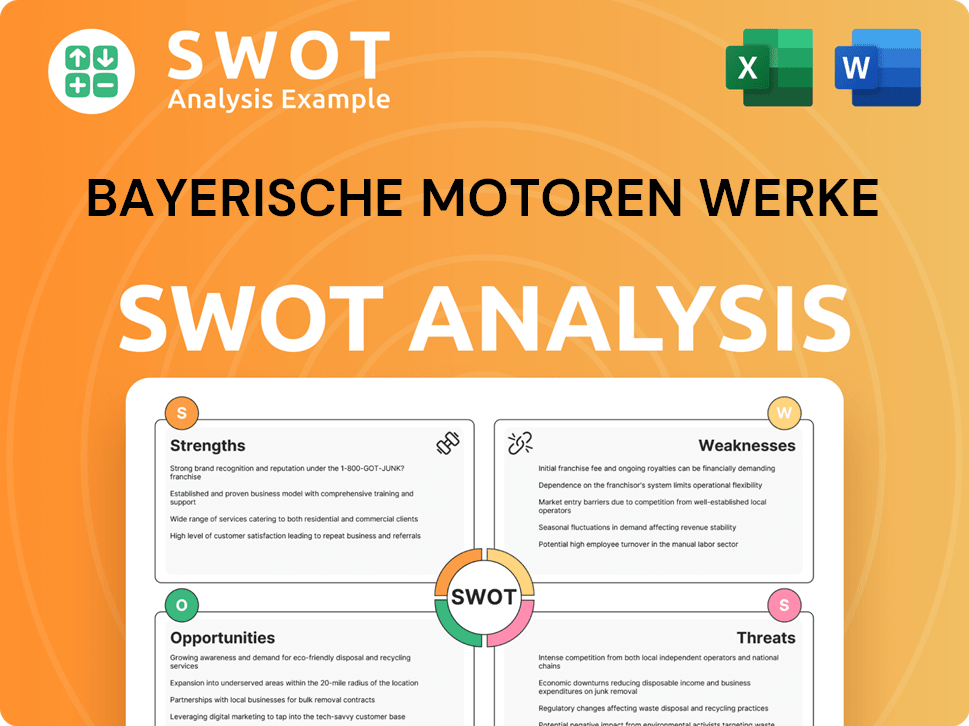
How Does Bayerische Motoren Werke Invest in Innovation?
The Target Market of Bayerische Motoren Werke is deeply influenced by its commitment to innovation and technological advancement. This focus is central to the company's growth strategy, driving its future prospects in a rapidly evolving automotive industry. By prioritizing cutting-edge technologies, the company aims to meet the changing needs and preferences of its customers, particularly in the areas of electrification and digitalization.
BMW's innovation strategy is designed to meet the rising demand for electric vehicles (EVs) and advanced digital features. The company is investing heavily in research and development to stay ahead of automotive industry trends, ensuring its products remain competitive and appealing to a global customer base. This approach supports the company's long-term business goals, aiming for sustainable growth in a dynamic market.
BMW's strategic investments in innovation and technology are crucial for its long-term success. These investments are designed to enhance its competitive position and meet the evolving demands of the automotive market. The company's focus on electrification, digitalization, and sustainability reflects its commitment to shaping the future of mobility.
In 2024, BMW Group's R&D expenditure reached a record high of €9.1 billion. This represents a significant increase of 17.1% from the previous year. The R&D investment accounted for 6.4% of the company's total revenue, underscoring its commitment to innovation.
The sixth generation of BMW's eDrive technology will launch with the Neue Klasse electric models. This system includes advancements in the high-voltage battery, electric motor, and the 'BMW Energy Master' control unit. The company is utilizing new cylindrical battery cells and an 800-volt electrical architecture.
The new battery technology promises over 20% higher energy density. Charging times will be 30% faster, and the range will extend by more than 30%. These improvements are crucial for enhancing the appeal of electric vehicles in the market.
Neue Klasse models will feature advanced digital architecture and intelligent driving technologies. Features include BMW Panoramic Vision, next-generation iDrive, and a 3D Head-Up Display. These elements aim to redefine the cockpit experience for drivers.
BMW is implementing digital transformation across its production network. The Munich facility uses AI to optimize processes like welding. Digital twin technology is also employed to simulate production system updates. This approach enhances efficiency and innovation.
The Landshut plant utilizes sensors, real-time data, and AI-driven processes. These tools are used to optimize supply chains and production. This data-driven approach helps improve operational efficiency and reduce costs.
BMW's innovation strategy includes several key initiatives aimed at driving future growth and competitiveness. These initiatives focus on technological advancements, digital transformation, and sustainability.
- Expansion in China: BMW is expanding its R&D footprint in China, with a focus on software development and AI-driven applications.
- Strategic Partnerships: A strategic partnership with Huawei aims to develop an in-car digital ecosystem based on the Harmony operating system.
- Sustainability Goals: BMW aims to reduce CO2 emissions for the entire lifecycle of its vehicles by 40% by 2030.
- iFactory Initiative: The iFactory initiative integrates cutting-edge sustainability practices, particularly in battery cell innovation.
Bayerische Motoren Werke PESTLE Analysis
- Covers All 6 PESTLE Categories
- No Research Needed – Save Hours of Work
- Built by Experts, Trusted by Consultants
- Instant Download, Ready to Use
- 100% Editable, Fully Customizable
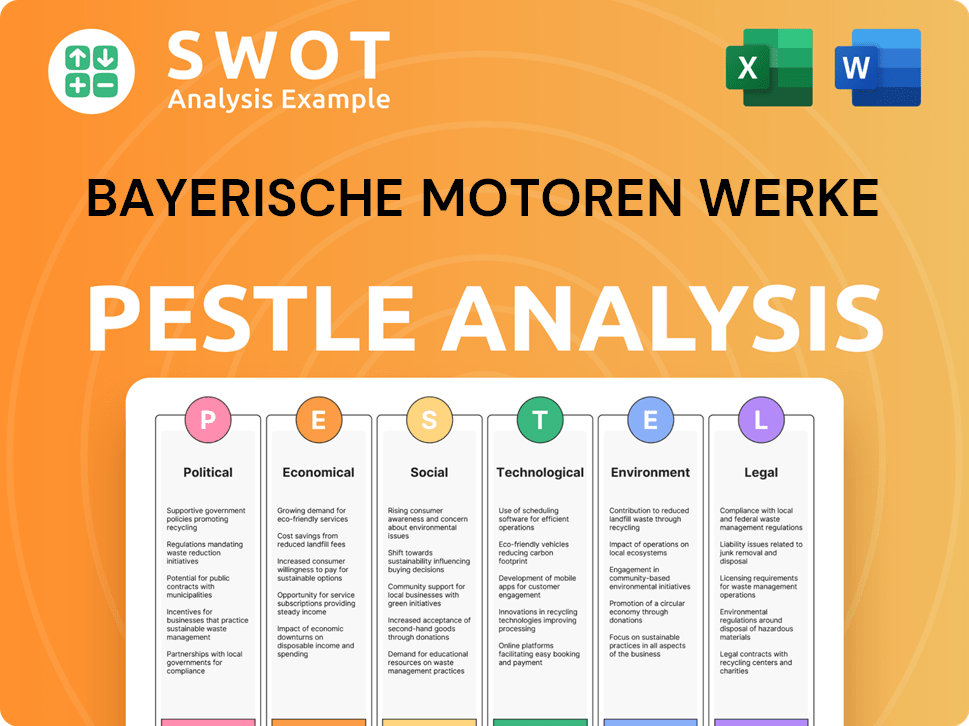
What Is Bayerische Motoren Werke’s Growth Forecast?
The financial outlook for Bayerische Motoren Werke (BMW) reveals a strategic focus on growth and shareholder value, even amidst fluctuating market conditions. The company anticipates a slight increase in sales volume in 2025, indicating continued expansion efforts within the automotive industry. This growth strategy is supported by a disciplined approach to capital allocation and a commitment to innovation, positioning the company for long-term success.
In 2024, the company met its revised guidance, demonstrating resilience and adaptability. Despite a decrease in Group earnings before tax (EBT) and the Automotive Segment's earnings before financial result (EBIT), BMW maintained a solid financial footing. The Automotive segment's EBIT margin reached 6.3%, within the adjusted corridor, highlighting the company's ability to manage profitability effectively.
Looking ahead to 2025, BMW's financial projections offer insights into its strategic priorities. The company expects its Automotive segment EBIT margin to be within a range of 5% to 7%, with a Return on Capital Employed (ROCE) between 9% to 13%. The Financial Services segment anticipates a Return on Equity (ROE) of 13% to 16%. These figures reflect BMW's commitment to sustainable growth and efficient capital management. To understand the company's origins, you can read a Brief History of Bayerische Motoren Werke.
BMW anticipates an Automotive segment EBIT margin between 5% and 7% in 2025. This projection reflects the company's ability to maintain profitability despite industry challenges. This is a key indicator for BMW's future prospects.
The company projects a ROCE between 9% and 13% for 2025. This metric showcases how efficiently BMW uses its capital to generate profits, indicating strong financial health and a positive outlook for BMW growth strategy.
The Financial Services segment is expected to achieve an ROE of 13% to 16%. This demonstrates the segment's contribution to the overall financial performance and its importance in BMW's business model.
Free cash flow in the Automotive segment is expected to exceed €5 billion in 2025, supported by lower capital expenditure. This is a positive sign for BMW market analysis and its ability to invest in future growth.
BMW's shareholder return strategy remains a priority, with a proposed dividend of €4.30 per share of common stock and €4.32 per share of preferred stock for 2024, resulting in a total dividend payout of €2.7 billion. This commitment is further reinforced by ongoing share buybacks.
- The proposed dividend represents a payout ratio of 36.7%, within the target range of 30% to 40%.
- The company acquired 6.35% of its share capital by December 31, 2024.
- BMW plans to purchase €4 billion in shares by April 2025.
Bayerische Motoren Werke Business Model Canvas
- Complete 9-Block Business Model Canvas
- Effortlessly Communicate Your Business Strategy
- Investor-Ready BMC Format
- 100% Editable and Customizable
- Clear and Structured Layout
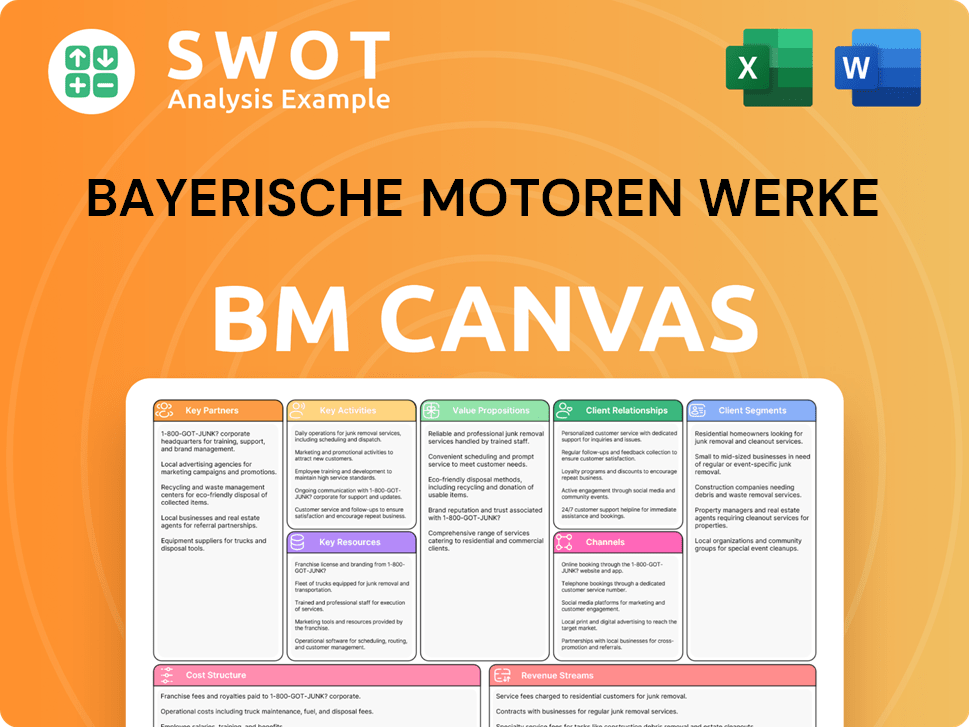
What Risks Could Slow Bayerische Motoren Werke’s Growth?
The Group faces several significant risks and obstacles that could affect its growth trajectory. These challenges include the ongoing shift towards electrification and digitalization in the automotive industry, increased competition, and stricter regulatory environments. Furthermore, economic downturns in key markets and escalating geopolitical tensions add complexity to the company's operational landscape.
Supply chain vulnerabilities and potential disruptions, such as the issue with the Integrated Braking System (IBS) in 2024, can lead to temporary delivery stops, recalls, and financial impacts. The company's financial performance is also subject to these factors. The company must navigate these challenges to maintain its market position and achieve its long-term goals.
Management actively assesses and prepares for these risks, leveraging its global presence and operational flexibility to adapt to market changes. The company is committed to open markets and opposes protectionist measures, recognizing the potential impact of additional customs duties on electric vehicle choices and decarbonization efforts. The Board of Management regularly monitors macroeconomic and geopolitical developments to identify opportunities and risks, ensuring that the company's financial position remains stable and that it can secure the necessary funding for its operations and future growth. Read more about the Marketing Strategy of Bayerische Motoren Werke.
Weak economic conditions in key markets like China and Germany pose a threat to BMW's growth. Escalating geopolitical conflicts and increasing trade barriers, particularly in the US, China, and the EU, can further hinder economic recovery. These factors can impact sales and profitability, requiring the company to adapt its strategies.
Supply chain vulnerabilities can lead to significant operational challenges. In 2024, the company experienced delivery stops and recalls due to the IBS issue, affecting sales and revenue. Additional provisions for warranty obligations also impacted the company's financials. Addressing these disruptions is crucial for maintaining production and sales.
The automotive industry faces increasing competition and continuously tightening regulatory conditions. Stringent emissions standards and the push for electric vehicles require substantial investments. Navigating these pressures effectively is vital for the company's long-term success.
Geopolitical conflicts and trade barriers present significant risks to BMW's operations. The company's global positioning and operational flexibility are crucial for adapting to these challenges. Monitoring and responding to these developments are essential for mitigating potential disruptions to the business.
The automotive industry's shift towards electrification and digitalization requires significant investments in new technologies. BMW's ability to innovate and adapt to these changes will be critical for maintaining its competitive edge. The company must also address consumer preferences and market demands.
Maintaining financial stability and securing necessary funding are essential for BMW's operations and growth. The company's financial position is expected to remain stable in 2025, with measures in place to meet liquidity needs. Effective financial planning is crucial for supporting its strategic initiatives.
BMW's electric vehicle strategy involves significant investments in research and development. The company aims to increase the production and sales of electric vehicles to meet growing demand and regulatory requirements. Success in this area is crucial for its future prospects. As of Q4 2024, BMW has shown sequential improvements in retail sales and profit.
BMW is committed to sustainability and circular economy principles to mitigate environmental risks. The company focuses on reducing CO2 emissions across its value chain. These initiatives are essential for long-term sustainability and aligning with global environmental goals. The company's global positioning and operational flexibility allow it to adapt to geopolitical challenges.
China is a key market for BMW, and expansion plans include increasing production capacity and sales. The company's ability to navigate the evolving market dynamics and regulatory environment in China is vital. BMW's long-term business goals include maintaining a strong presence in the Chinese market.
The competitive landscape includes major automotive manufacturers. Analyzing competitors' strategies and market positions is crucial for BMW's success. The company must continuously innovate and adapt to maintain its market share. The Board of Management regularly focuses on macroeconomic and geopolitical developments.
Bayerische Motoren Werke Porter's Five Forces Analysis
- Covers All 5 Competitive Forces in Detail
- Structured for Consultants, Students, and Founders
- 100% Editable in Microsoft Word & Excel
- Instant Digital Download – Use Immediately
- Compatible with Mac & PC – Fully Unlocked
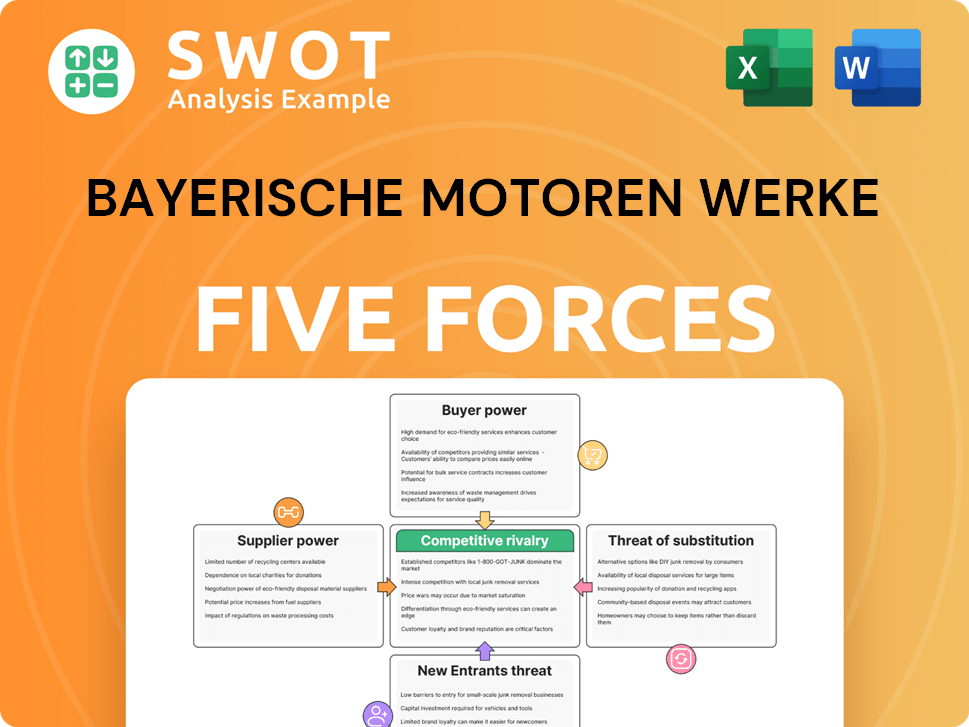
Related Blogs
- What are Mission Vision & Core Values of Bayerische Motoren Werke Company?
- What is Competitive Landscape of Bayerische Motoren Werke Company?
- How Does Bayerische Motoren Werke Company Work?
- What is Sales and Marketing Strategy of Bayerische Motoren Werke Company?
- What is Brief History of Bayerische Motoren Werke Company?
- Who Owns Bayerische Motoren Werke Company?
- What is Customer Demographics and Target Market of Bayerische Motoren Werke Company?
Disclaimer
All information, articles, and product details provided on this website are for general informational and educational purposes only. We do not claim any ownership over, nor do we intend to infringe upon, any trademarks, copyrights, logos, brand names, or other intellectual property mentioned or depicted on this site. Such intellectual property remains the property of its respective owners, and any references here are made solely for identification or informational purposes, without implying any affiliation, endorsement, or partnership.
We make no representations or warranties, express or implied, regarding the accuracy, completeness, or suitability of any content or products presented. Nothing on this website should be construed as legal, tax, investment, financial, medical, or other professional advice. In addition, no part of this site—including articles or product references—constitutes a solicitation, recommendation, endorsement, advertisement, or offer to buy or sell any securities, franchises, or other financial instruments, particularly in jurisdictions where such activity would be unlawful.
All content is of a general nature and may not address the specific circumstances of any individual or entity. It is not a substitute for professional advice or services. Any actions you take based on the information provided here are strictly at your own risk. You accept full responsibility for any decisions or outcomes arising from your use of this website and agree to release us from any liability in connection with your use of, or reliance upon, the content or products found herein.